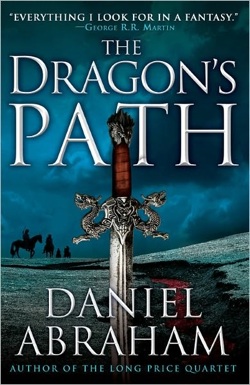It’s unfair to expect me to review Daniel Abraham’s The Dragon’s Path because it’s so exactly what I’ve been wanting to read. There’s no way Abraham could have known I’ve been re-reading Dunnett’s Niccolo books and wishing for fantasy like them, or that I read a pile of stuff on the Medici prior to my recent trip to Florence. Even if he had known, and had been kind enough to want to write something just for me, the timing doesn’t work. The Dragon’s Path was out already and sitting on the shelf waiting for me to have time to read it. But it’s nevertheless so exactly what I wanted right now that I distrust my enthusiasm for it. (Do normal people want fantasy novels about Renaissance banking?)
In any case, this is a subtle intelligent fantasy novel about a world with a long history and fascinating economics, with war, peril, and adventure, and great characters of both genders. It’s exactly what you’d expect from the author of the Long Price Quartet (post) if he’s been asked to produce something a bit more European, a bit more mainstream, a bit more Martinesque.
The world here is like a Renaissance Europe if the Romans had been dragons and built their roads out of jade. There are various races of intelligent humans living together in relative peace—which is to say that the lines war follows are not generally racial but political and economic. There’s a lot of war going on, and threats of worse war—going down the dragon’s path. We begin with a glimpse of evil—the spider goddess who wants to eat the world—and then focus down on four characters, Cithrin, the girl who has grown up in a bank, Marcus, the old mercenary who doesn’t fight for kings, Geder, the chubby intellectual who doesn’t enjoy being in the army, and Dawson, a traditionalist noble prepared to fight and scheme for his honour. Like Martin, Abraham cycles between these points of view and uses them to illuminate the world and what is happening in it. And there’s plenty happening!
This is the beginning of a new series, so the world and the characters are being introduced here for the first time. The dragons created a number of variant races of humanity, who can more or less interbreed—Cithrin is a half-Cinnae, and Cinnae mixes aren’t unusual, but we’re told some crossbreeds are sterile. There are tusked races and ones with glowing eyes. I expect Abraham is going to do something really interesting with these later, but so far they’re just scenery there to make things more colourful. The spider-goddess gives her worshippers spiders in their blood and the ability to know when somebody is telling the truth—and this is most of the actual magic that we see. A lot of this book feels like getting things into place for future developments. But there are burning cities and duels and honour and treachery. I’ll be buying the next volume the moment it hits the shelves.
(I have to say though, for me, the best bit really is the banking.)
Jo Walton is a science fiction and fantasy writer. She’s published two poetry collections and nine novels, most recently Among Others, and if you liked this post you will like it. She reads a lot, and blogs about it here regularly. She comes from Wales but lives in Montreal where the food and books are more varied.










